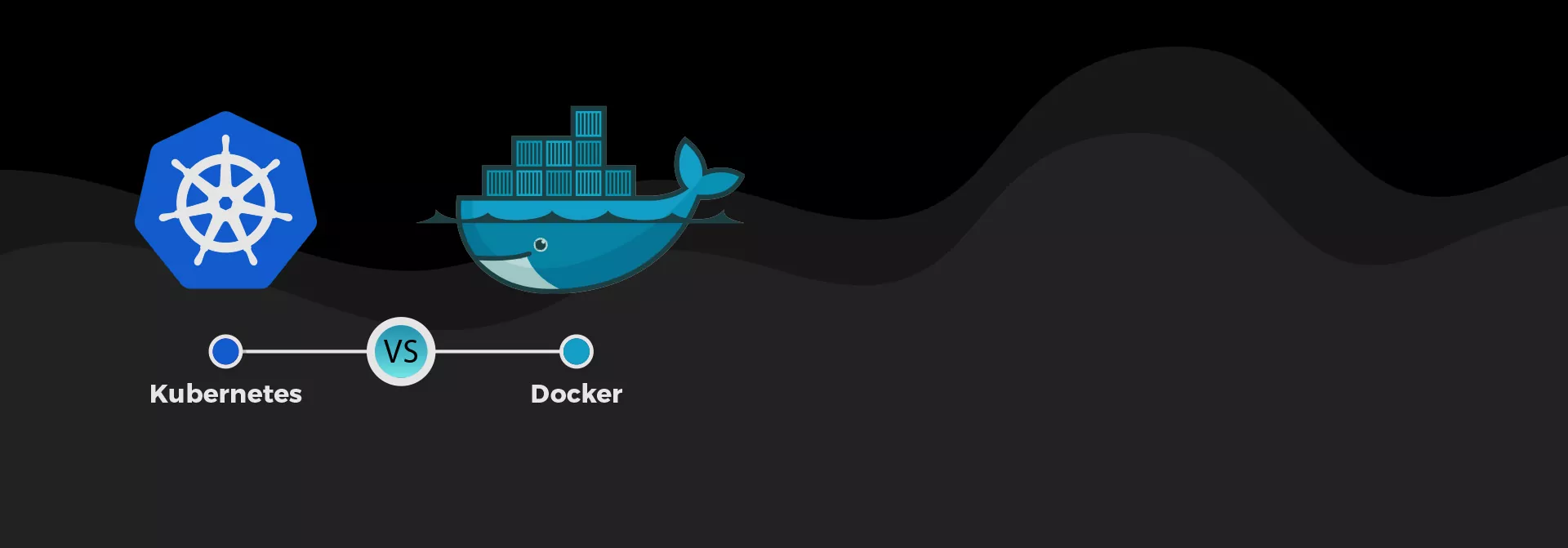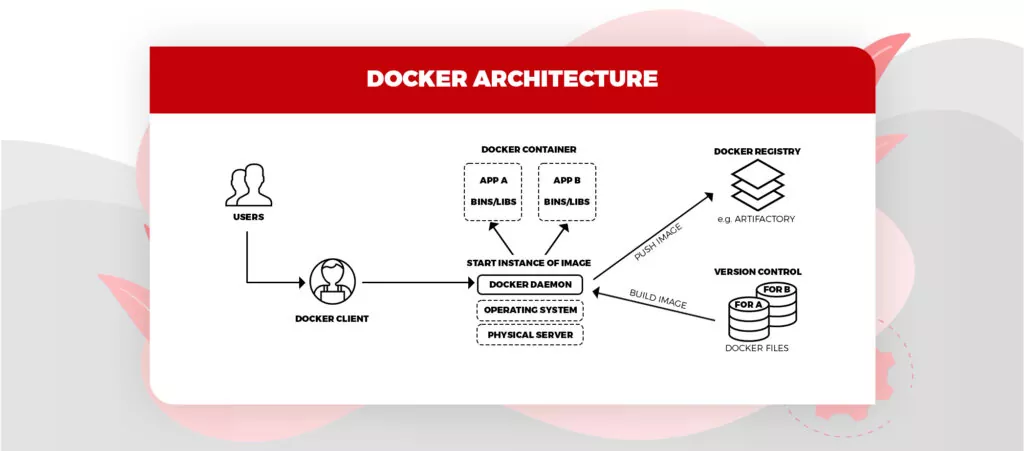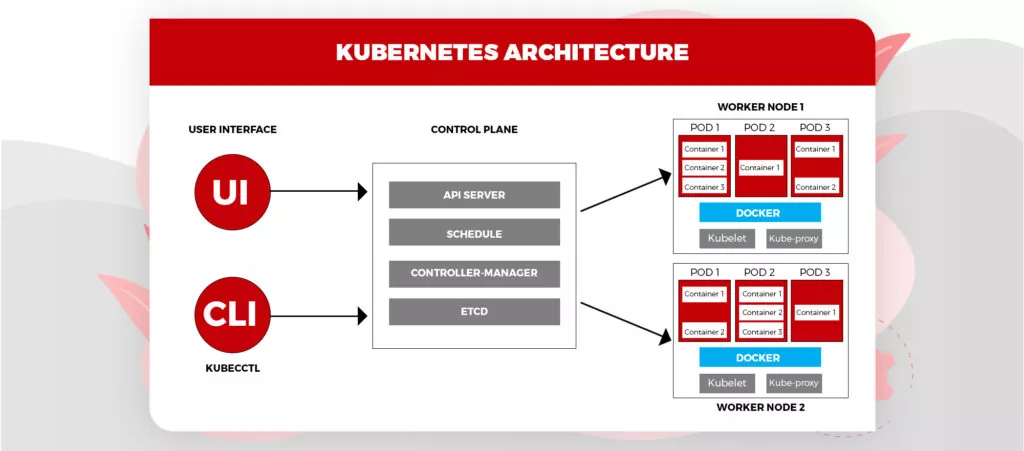
Today, there is a buzz all around about containerization, Kubernetes, and Docker. What is Docker and Kubernetes used for and how they are linked with containerization? What are the top advantages of utilizing Docker and Kubernetes, the Difference between Docker and Kubernetes? In this blog, we will answer all these queries.
Table of Contents
ToggleWhat is a Container?
A container is an independent unit that contains code and all its dependencies together so the application can run quickly from one computing environment to another. But there is a cloud container security checklist that must be followed during the SDLC. Click here to know Kubernetes and Container Security Checklist to Build Secure Apps. In the upcoming section of Kubernetes Vs Docker, we will find out which is the better container orchestration system between Docker and Kubernetes and what is Docker and Kubernetes used for.
Benefits of Containers –
- Less overhead: Containers require fewer resources as compared to the traditional environments since they do exclude operating system images.
- Expanded portability: Applications running in containers can be deployed effectively to different OS and hardware platforms.
- More reliable operation: Hire devops developers groups know applications in containers will run in the same manner, irrespective of the platform they are deployed.
- Better productivity: Containers permit applications to be all the more quickly deployed, fixed or scaled.
- Better application development: Containers support agile and DevOps endeavors to speed up development, test, and production cycles.
Also Read – DevOps – The Next Game Changer in SDLC
Definition: Kubernetes Vs Docker
What is Docker?
Docker is a containerization platform. Fundamentally, it’s a toolkit that makes it simpler, more secure, and quicker for engineers to build, deploy and manage containers. In spite of the fact that it started as an open-source project, Docker today also refers to Docker, Inc., the organization that produces commercial Docker products. Presently, it is the most famous tool for making containers, regardless of whether developers use Windows, Linux, or MacOS.

Some of the tools and terminology related to Docker –
- Docker Engine: The runtime environment that permits developers to create and run containers.
- Dockerfile: A text document that defines everything needed to assemble a Docker container image, for example, file locations and OS network specification. It’s basically a list of orders that Docker Engine will run to collect the image.
- Docker Compose: A tool for characterizing and running multi-container applications. It makes a YAML document to determine the services that the application contains and can be deployed with a single order through the Docker CLI.
Read more: Kubernetes & Container Security Checklist Best Practices
Kubernetes VS Docker - Which to Adopt ?
“Kubernetes Vs Docker: Get to know difference between Docker and Kubernetes”
Reference video by Simplilearn.
What is Kubernetes?
Kubernetes is an open-source platform used to automate the containerized workload management. It automates the load balancing, manages service discovery, tracks resource allocation, and several other activities required for automatic containers deployment.

Benefits: Kubernetes vs Docker
Benefits of Docker
- Offers an easy initial setup
- Simple configuration
- Incorporates and works with existing Docker tools
- Permits you to describe your application lifecycle
- User can track container versions easily to look at inconsistencies between earlier versions.
- Documentation offers every piece of information.
- Guarantees that application is isolated
Benefits of Kubernetes
- Easy Organization of service with pods
- Holds fast to the principles of an unchanging framework.
- Developed by Google having impeccable industry experience
- One of the largest Communities among container management tools
- Offers different storage alternatives for on-premises SANs and public cloud.
Weaknesses: Kubernetes Vs Docker
Weaknesses of Kubernetes
- Relocating to stateless requires extra efforts
- Restricted functionality as per the accessibility in the Docker API.
- Profoundly intricate Installation/configuration measures
- Not viable existing Docker CLI and Compose tools
- Complex automatic scale-up settings and manual cluster deployment
Weaknesses of Docker
- Doesn’t give a storage choice
- Poor monitoring option
- Absence of automatic rescheduling of non-active Nodes
- Every action is must be performed in CLI
- Manual dealing with multiple instances
- Need support for different devices for production aspect – observing, mending, scaling
- Complicated manual cluster deployment
Also Read : Kubernetes Incident Response strategy – A Complete Guide 2022
Kubernetes Vs Docker: Difference between Docker and Kubernetes
Some Key Kubernetes and Docker Differences –
- Docker Swarm is developed by Docker Inc. and Kubernetes is developed by Google.
- Kubernetes supports Auto-scaling while Docker Swarm doesn’t.
- Kubernetes can support around 5000 hubs while Docker Swarm can support around 2000 hubs.
- Docker Swarm is comprehensive and highly customized whereas Kubernetes is comparatively less extensive and customized.
- Kubernetes gives low fault tolerance as compared to Docker.
Comparison: Kubernetes Vs Docker Swarm
| Developed By | Docker Inc | |
| Released Year | 2014 | 2013 |
| Scaling | Autoscaling | No Autoscaling |
| Installation | Complex and time taking | Easy and quick |
| Load Balancing | Requires manual configure for load balancing setting | Auto load balancing |
| Cluster SetUp | Setting up the cluster requires only two commands. | Setting up the cluster is complicated. |
| Data Volume | Shares storage volumes with other containers | Can share storage volumes within multiple containers in the same Pod. |
| Scalability | Scaling up is slow but guarantees stronger cluster state | Can scale up faster than K8S. However, it’s cluster strength is not robust. |
| Optimized for | Multiple small cluster | Single large cluster |
| Tolerance Ratio | Low Fault tolerance rate | High Tolerance Rate |
| Container Limit | Limited to 300000 containers | Limited to 95000 containers |
| Public Cloud Service Provider | Google, Azure, and AWS. | Azure only |
| Compatibility | Comprehensive and highly customizable | Less extensive and customizable |
Kubernetes Vs Docker: Pick Your Best Container Solution
Hope that you have clearly understood Kubernetes and Docker Differences. So, can We Use Docker Without Kubernetes? Generally, Docker is used without Kubernetes. While Kubernetes offers many advantages, it is complicated and there are numerous situations where the overhead of spinning up Kubernetes is superfluous or undesirable. Docker can be used without a container orchestrator like Kubernetes. In the application development environment, the benefit of adding Kubernetes is negligible infront of the complexity it causes. Also, numerous public cloud services like AWS, GCP, and Azure give some orchestration capacities making the tradeoff of the additional intricacy superfluous.
Can We Use Kubernetes Without Docker? Being a container orchestrator, Kubernetes needs a container runtime to orchestrate. Kubernetes is mostly used with Docker, yet it can likewise be utilized with any container runtime such as RunC, and cri-o. Overall, we can say that both Docker and Kubernetes can run independently without involving the other.
The bottom line is that both Docker and Kubernetes are industry standard in their particular expertise and together they offer a well-integrated platform for container orchestration at scale. It was never actually an issue of Kubernetes Vs Docker; it was always Docker and Kubernetes, and today this is considerably more evident.
Now, we would sum up the article by saying that if you are an employer looking for cloud professionals with hands-on experience on Docker and Kubernetes, PeoplActive is the platform which can fulfill your hiring devops engineer needs ASAP.



